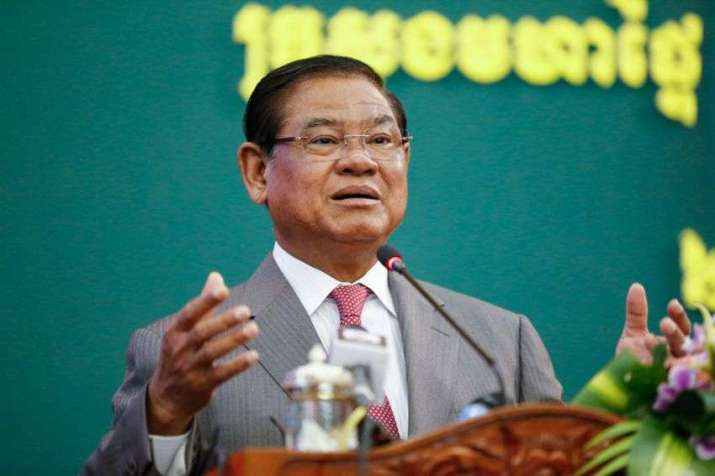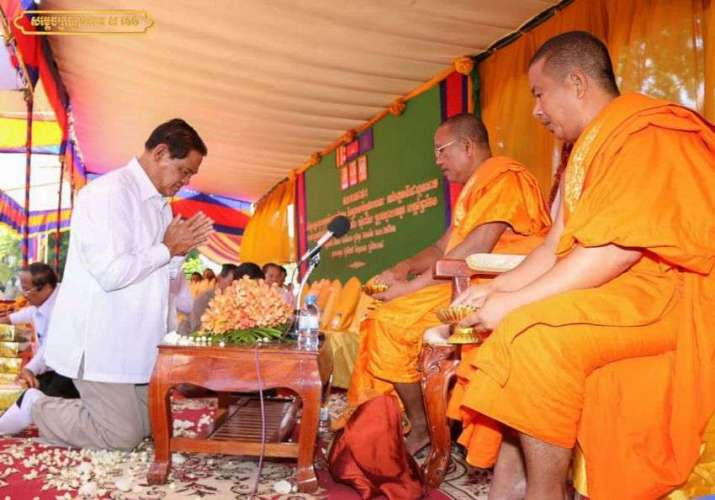BY – SHYAMAL SINHA

Sar Kheng. One of the highest-ranking members of the ruling Cambodian People’s Party, he is the current Minister of the Interior and has served as a Deputy Prime Minister since 1992 . He also represents the province of Battambang in the Cambodian Parliament.
Cambodia’s interior minister Sar Kheng expressed hope last Saturday for a deeper Buddhist engagement with Cambodian society during a visit to Prey Veng Province. The senior politician made his statement during a dedication ceremony at a pagoda in the Popeus commune of Svay Antor District on 25 May.
“We have rapidly developed solid infrastructure [for Buddhists],” Sar Kheng told monks and attendees at the ceremony. “I want to point out that we have built pagodas and other Buddhist buildings and sponsored schools. We have constructed them quickly at a cost of hundreds of millions of dollars. Overall spending has been huge. But I want to put further emphasis on doing what we can to ensure Buddhism has a deeper and stronger influence.” (The Phnom Penh Post)
In his speech, Sar Kheng estimated that there were presently more than 5,000 pagodas and 60,000 monastics across the kingdom. He also praised the piety of Buddhists and other faith traditions, saying that Christians showed good discipline and that Muslims respected their religion in all activities and places.
The Phnom Penh Post reported that Sar Kheng, who also serves as deputy prime minister, noted that building infrastructure such as pagodas would not serve a useful purpose if not enough people applied the Dharma’s teachings in their lives. His comments reflected a growing concern that Buddhist institutions and lay society needed to interface more closely. “Our society is good. People live without fear. And when our society lives without fear, progress will come,” he said. (The Phnom Penh Post)
“Buddhist monasteries should overlap with the rest of society and serve society which builds the pagodas and provides alms for the upkeep of Buddhist monks,” political analyst Lao Mong Hay toldThe Phnom Penh Post, emphasizing that it was incumbent on the monks to offer themselves as spiritual leaders and to contribute to the moral lives of laypeople. Instead, he warned, many young monks preferred to leave behind the saffron robes after their monastic education and enter the secular world. (The Phnom Penh Post)
On Sunday, Ministry of Religions and Cults spokesman Seng Somony stated: “Through pagodas, we have trained religious leaders and equipped them with knowledge of legal and administrative matters where they were unsure about national or international law.” (The Phnom Penh Post)
Commenting on the pace of Buddhist momentum relative to the growth of secular values and scientific development, he noted: “If we’re driving in a car and another vehicle overtakes us, it might seem like we’re going slowly. But our vehicle is also fast and we’re moving steadily forward.” (The Phnom Penh Post)

Buddhism continues to exert considerable social influence in Cambodia, although monks do not serve as professional politicians (as in Sri Lanka), and avoid discussing politics. In February, Supreme Patriarch Non Nget, Great Supreme Patriarch Tep Vong, and Minister of Religions and Cults Him Chhem forced former monk Hor Sokhon to defrock after he made a Facebook post praising Sar Kheng as ideally placed to negotiate an end to international sanctions against the country, as well as preventing the revocation of the European Union’s “Everything but Arms” (EBA) trade scheme. (Khmer Times)
The EBA scheme, which has been in place since 2001, allows Cambodia to export anything except weapons to the EU market duty-free and quota-free. The revocation of this special arrangement became a concern to Cambodia after the EU launched a review in February in response to alleged humans rights violations by the government. Calculating the direct economic benefits of the EBA scheme and the consequences of its revocation has proved difficult. Since 2003, however, the country’s poverty rate declined from 50.2 per cent in that year down to 13.5 per cent by 2014. (The Diplomat)
However, Hor Sokhon’s ordination and position as chief of Chbar Ampov Pagoda in Phnom Penh and adviser to the supreme patriarch became untenable after the Cambodian People’s Party (CPP) interpreted his post as speculating on party discipline and endangering the strict separation of monastic authority and formal politics. (Khmer Times)
Buddhism has been Cambodia’s state religion since 1991. Since 1885 (with the exception of a decade of unity between 1981 and 1991), the country has had two primary clerical orders, the Thommayut (Dhammayuttika Nikaya) and Mohanikay (Maha Nikaya). The Mohanikay is the larger of these two fraternities, despite royal patronage of the Thommayut. The prominent thinker and activist Maha Ghosananda (1913–2007), who popularized a vision of Cambodian engaged Buddhism, was part of the reformist wing of the Mohanikay. The present prime minister, Hun Sen, along with other senior officials, are seen to be patrons of the more conservative “boran” movement within the Mohanikay. From an ecclesiastic perspective, the Thommayut falls somewhere between these two wings of the Mohanikay.
Kheng continues to attempt to be a mediating force in Cambodia politics.
source – Buddhistdoor Global











